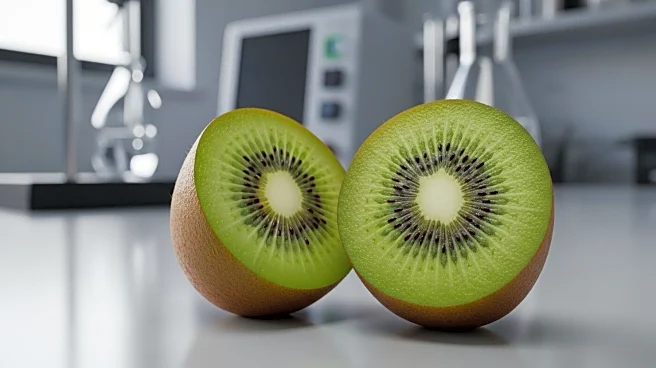What's Happening?
Researchers from Universidad Santiago de Cali, Universidad de Antioquia, and Universidad Nacional de Colombia have conducted a study on the use of actinidin, an enzyme derived from kiwi fruit, to generate bioactive peptides with potential anti-aging applications in cosmetics. The study, funded by the Dirección General de Investigaciones of Universidad Santiago de Cali, focused on the enzyme's ability to inhibit collagenase and elastase, enzymes that contribute to skin aging by breaking down collagen and elastin. The research highlighted actinidin's advantages, including its natural origin, broad pH stability, and low immunogenicity, making it a sustainable alternative for cosmetic bioconversion. The study involved extracting actinidin from kiwi pulp and applying it to bovine casein, resulting in peptides with moderate antioxidant and enzyme-inhibiting properties.
Why It's Important?
The study's findings are significant for the cosmetics industry, which is increasingly seeking natural and sustainable ingredients for anti-aging products. The use of fruit-derived enzymes like actinidin aligns with consumer demand for eco-friendly and effective skincare solutions. The peptides generated through this process offer a potential alternative to conventional cosmetic actives, with the ability to slow down the enzymatic breakdown of collagen and elastin. This research could lead to the development of new topical formulations that support anti-aging treatments, benefiting both consumers and manufacturers looking to innovate in the personal care market.
What's Next?
The researchers have emphasized the need for further validation of their findings. Future studies are recommended to focus on in vivo validation, skin permeation assays, and advanced peptide characterization to ensure formulation scalability and clinical relevance. Additionally, purification and chemical synthesis of key peptide sequences are suggested for more robust testing. These steps are crucial for translating the study's early-stage results into commercially viable cosmetic products.
Beyond the Headlines
The study underscores the growing trend towards sustainable and natural cosmetics, highlighting the ethical and environmental considerations in ingredient sourcing. The use of food-grade substrates and fruit-derived enzymes reflects a shift in the industry towards more responsible and eco-conscious practices. This approach not only caters to consumer preferences but also supports broader efforts to reduce the environmental impact of cosmetic production.











